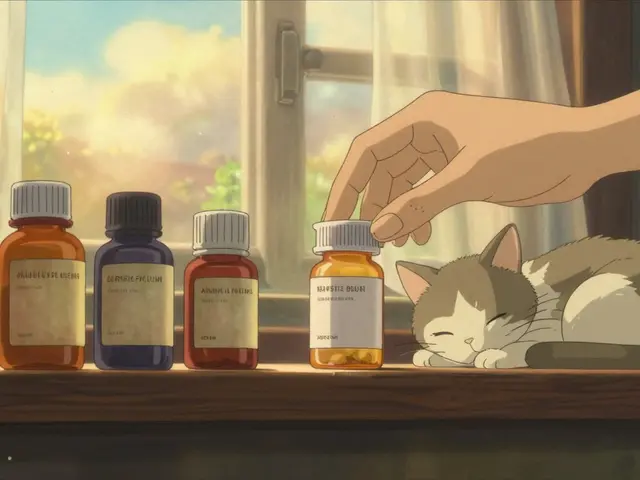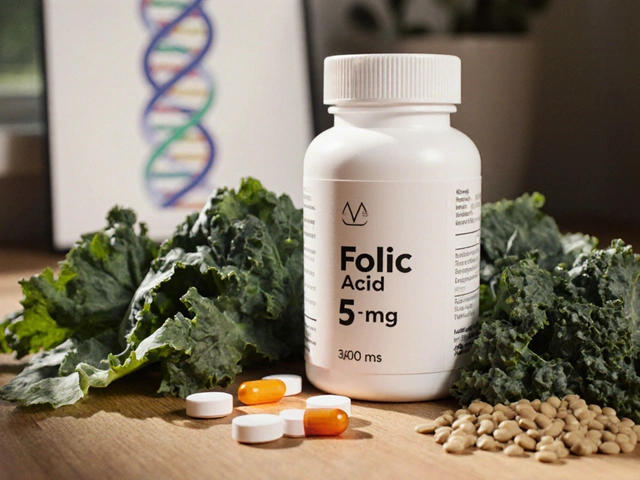
When you're taking medication for a chronic condition-whether it's high blood pressure, cancer, depression, or diabetes-you know the side effects can be just as hard to deal with as the illness itself. Nausea, fatigue, nerve pain, dry mouth, dizziness, or stomach upset aren't just inconveniences. They can make you skip doses, lose sleep, or even quit treatment altogether. That’s why so many people turn to complementary treatments-not to replace their meds, but to help manage the fallout.
But not all of these options are created equal. Some have solid science backing them. Others? They’re risky, untested, or even dangerous when mixed with your prescription. The key isn’t just trying anything that sounds natural. It’s knowing what actually works, what doesn’t, and how to use it safely.
What Counts as an Evidence-Based Complementary Treatment?
Complementary treatments aren’t alternative medicine. They’re not meant to substitute for your doctor’s prescribed plan. Instead, they’re used alongside it to ease symptoms. The National Center for Complementary and Integrative Health (NCCIH) defines them as practices like acupuncture, herbal supplements, yoga, or massage that have been studied in clinical trials and shown to help with specific issues.
According to data from the 2012 National Health Interview Survey, about 38% of U.S. adults use some form of complementary therapy. And nearly half of those people-45.8%-do it specifically to manage side effects from medications. That’s not a small trend. It’s a widespread need.
But here’s the catch: most people don’t tell their doctors about it. In one UK hospital study, only 21% of patients using complementary therapies disclosed them to their healthcare providers. That’s dangerous. Herbs, supplements, and even certain teas can interact with your meds in ways that aren’t obvious. Garlic can thin your blood when you’re on aspirin. St. John’s wort can cancel out antidepressants. Milk thistle might damage your liver if you’re on chemo.
Acupuncture: Proven Relief for Nausea, Pain, and Constipation
If you’re looking for one complementary treatment with the strongest evidence, acupuncture is it.
A 2017 meta-analysis in JAMA Oncology found that acupuncture reduced chemotherapy-induced nausea by 36% compared to sham treatments. That’s not a minor improvement. That’s comparable to some of the strongest anti-nausea drugs-but without the drowsiness or dry mouth.
It also helps with opioid-induced constipation. A 2020 Cochrane review of 41 trials involving nearly 5,000 patients showed acupuncture was 32% more effective than standard care alone at improving bowel movements. Patients reported fewer bloating episodes and less need for laxatives.
And it doesn’t stop there. For people on chemotherapy or radiation, acupuncture has been shown to reduce nerve pain (peripheral neuropathy) by about half. One patient on Taxol reported, “After six sessions, my tingling and burning in my feet dropped from a 7 to a 3 on the pain scale.”
Acupuncture is generally safe when done by a licensed practitioner. Minor bruising or soreness at needle sites is the most common side effect. Serious complications are extremely rare. And because it doesn’t involve chemicals, it has almost no interaction risk with medications.
Ginger: The Kitchen Staple That Actually Works for Nausea
You don’t need a clinic visit to try ginger. It’s in your spice rack. And it’s backed by solid research.
A 2013 study in the Journal of Pain and Symptom Management found that taking 0.5 to 1.0 gram of ginger daily-either as capsules, tea, or chewable candies-reduced chemotherapy-induced nausea by 40%. That’s better than placebo and on par with some prescription anti-nausea meds.
One Reddit user, u/ChemoSurvivor2022, wrote: “I switched from ondansetron to ginger capsules. My nausea dropped 70%. I could finally eat without feeling like I’d throw up.”
Ginger is generally safe for most people. But if you’re on blood thinners like warfarin, talk to your doctor first. Ginger can slightly increase bleeding risk, especially at high doses. Stick to the 1-gram daily limit unless advised otherwise.

Hawthorn and L-Arginine: Heart Medication Side Effects
If you’re on medication for heart failure, high blood pressure, or arrhythmias, you’re likely dealing with fatigue, dizziness, or low energy. Hawthorn and L-arginine are two natural compounds that show promise-but only under careful supervision.
Hawthorn, a berry used in European herbal medicine, has been studied for its ability to improve heart function in mild heart failure. A 2022 American Heart Association statement found it’s generally well tolerated, with side effects like mild dizziness or upset stomach being no more common than with placebo.
But here’s the warning: Hawthorn may interact with beta-blockers, ACE inhibitors, or digoxin. The evidence is mixed. Some studies suggest it enhances the effects, which could be helpful-or dangerous if your blood pressure drops too low.
L-arginine, an amino acid, helps relax blood vessels and improve circulation. It’s been used to reduce fatigue and improve walking distance in people with heart disease. Studies show doses up to 12 grams per day are usually safe. But it can cause stomach cramps, diarrhea, or low blood pressure.
Neither should be started without consulting your cardiologist. These aren’t harmless teas. They’re bioactive compounds that can change how your heart meds work.
The Dangerous Side of Herbal Supplements
Not all natural products are safe. Some can be toxic, especially when mixed with prescription drugs.
Blue cohosh, sometimes used for menstrual issues, can cause fast heart rate, high blood pressure, and chest pain. Lily of the valley, sold as a heart tonic, can dangerously lower potassium levels if taken with digoxin-a common heart failure drug.
Even popular supplements carry risks. A 2018 study in the Journal of Clinical Oncology found that over half of cancer patients used herbal products. Of those, 12.2% were warned by their doctors because of dangerous interactions. Echinacea could interfere with immunotherapy. Garlic can thin your blood if you’re on aspirin or lisinopril. Fish oil and ginkgo can increase bleeding risk before surgery.
And then there’s contamination. The Better Health Channel reports that many supplements sold online or in health stores contain unlisted ingredients-sometimes heavy metals, pesticides, or even prescription drugs. One woman took a “natural energy booster” that turned out to contain hidden stimulants. She ended up in the ER with a racing heart.
There’s no FDA pre-market testing for supplements. If it’s sold as a “dietary supplement,” it’s not required to prove safety or purity before hitting shelves.
What About Mind-Body Practices?
Yoga, meditation, and tai chi aren’t just for relaxation. They help manage the emotional and physical toll of long-term medication use.
Chronic pain from nerve damage? Yoga improves flexibility and reduces pain perception. Fatigue from chemo or antidepressants? A 2021 study showed 15 minutes of daily meditation improved energy levels and sleep quality better than placebo.
Mind-body practices don’t interact with drugs. They don’t cause liver damage. Their only downside? They require consistency. You won’t feel better after one session. But after four to six weeks of regular practice, many patients report better mood, less anxiety, and improved ability to cope.

How to Use Complementary Treatments Safely
Here’s the reality: you’re going to hear about dozens of “miracle cures.” Don’t believe them. Do this instead:
- Always tell your doctor. Bring a list of everything you take-even vitamins, teas, or essential oils. If you’re embarrassed, say: “I’m trying to manage side effects and want to make sure it’s safe.”
- Check for interactions. Use the Memorial Sloan Kettering About Herbs app or the NCCIH interaction checker. Both are free and updated monthly.
- Start low, go slow. If you’re trying ginger or acupuncture, give it 2-4 weeks. Don’t stack five supplements at once.
- Buy from trusted sources. Look for third-party tested brands (USP, NSF, or ConsumerLab certified). Avoid products with vague labels like “proprietary blend.”
- Stop if something feels off. New dizziness, rash, nausea, or irregular heartbeat? Discontinue and call your doctor.
What’s Changing in 2025?
The field is evolving. In 2023, the NIH allocated $142 million to research complementary therapies, with 37% focused specifically on medication side effects. The National Institutes of Health launched its Precision CAM initiative to find biomarkers that predict who responds to which treatment.
More cancer centers-73% now-offer integrative medicine services. But only a third have formal protocols for managing side effects with complementary tools.
And the market? It’s growing fast. The global complementary medicine market hit $191 billion in 2022 and is expected to grow 20% annually through 2028. But growth doesn’t mean safety. The FDA issued a warning in April 2023 about kratom products linked to nearly 200 deaths since 2016.
The message is clear: more options don’t mean better outcomes. Better information does.
Final Thought: It’s About Control
When you’re on long-term medication, you often feel powerless. Side effects take away your appetite, your energy, your sleep. You feel like a patient, not a person.
Complementary treatments-when used wisely-can give you back some control. Acupuncture for nausea. Ginger for vomiting. Yoga for fatigue. These aren’t magic. They’re tools. And like any tool, they work best when you know how to use them safely.
The goal isn’t to ditch your meds. It’s to live better while taking them.
Can I use herbal supplements instead of my prescribed medication?
No. Herbal supplements are not substitutes for prescribed medications. Stopping your medication without medical supervision can lead to serious health consequences, including hospitalization or death. Complementary treatments are meant to be used alongside, not instead of, conventional therapy. Always talk to your doctor before making any changes to your treatment plan.
Which complementary treatments have the most evidence for reducing nausea from chemo?
Acupuncture and ginger have the strongest evidence. A 2017 JAMA Oncology meta-analysis showed acupuncture reduced chemotherapy-induced nausea by 36% compared to sham treatments. A 2013 study found that 0.5-1.0 gram of ginger daily reduced nausea by 40%. Both are considered safe and effective when used correctly and disclosed to your oncology team.
Is it safe to take fish oil with blood pressure medication?
Fish oil can lower blood pressure slightly, and when taken with antihypertensive drugs like lisinopril or beta-blockers, it may cause your blood pressure to drop too low. It can also increase bleeding risk if you’re on blood thinners. Always check with your doctor before combining fish oil with prescription meds. Doses above 3 grams per day require medical supervision.
Why don’t more doctors recommend complementary treatments?
Many doctors haven’t received formal training in complementary medicine. A 2021 study found that only 32% of physicians are familiar with tools like the Memorial Sloan Kettering About Herbs database. Plus, the supplement market is poorly regulated, so many products lack proof of safety or efficacy. Doctors worry about interactions and liability. But integrative medicine programs at major hospitals are changing this-offering training and protocols for safe use.
Are there any complementary treatments that are always dangerous?
Yes. Blue cohosh can cause dangerous heart rhythm changes and high blood pressure. Lily of the valley can trigger life-threatening low potassium levels when taken with digoxin. Kratom has been linked to nearly 200 deaths since 2016, according to the FDA. Avoid these entirely. Also, avoid any supplement with unlisted ingredients, “proprietary blends,” or no third-party testing. If it sounds too good to be true, it probably is.
How do I know if a supplement is high quality?
Look for third-party verification labels: USP, NSF, or ConsumerLab. These organizations test products for purity, potency, and contamination. Avoid products that don’t list exact ingredient amounts or use vague terms like “proprietary blend.” Buy from reputable retailers or brands with transparent sourcing. When in doubt, check the Memorial Sloan Kettering About Herbs app-it rates supplements by safety and evidence.
Can I use yoga or meditation instead of antidepressants?
No. While yoga and meditation can improve mood, reduce anxiety, and help with sleep, they are not replacements for antidepressants in moderate to severe depression. They can be powerful complements-helping reduce side effects like fatigue or insomnia-but should never be used alone if your doctor has prescribed medication. Always consult your psychiatrist before making changes.
14 Comments
Write a comment
More Articles

How Long Medications Actually Remain Effective After Expiration
Most medications remain effective years after their expiration date - if stored properly. Learn which pills still work, which ones to avoid, and why expiration dates are more about profit than science.



Christopher Robinson
November 19, 2025 AT 00:46Acupuncture for chemo nausea? Game changer. My aunt did 8 sessions and finally ate solid food again. No more vomiting after meals. And zero drowsiness like with the prescription stuff. Seriously, if your oncologist won’t refer you, find a licensed practitioner. Worth every penny.